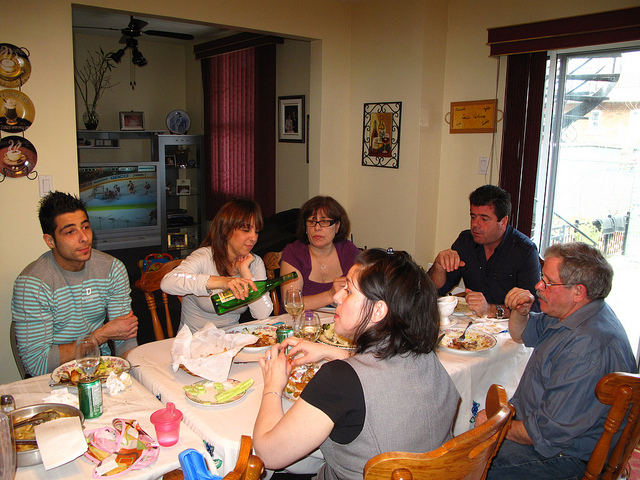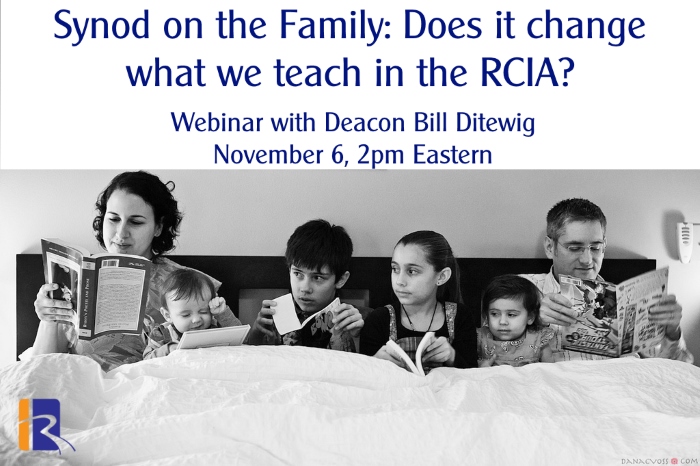 On the evening before the opening of the Synod on the Family, Pope Francis said this:
On the evening before the opening of the Synod on the Family, Pope Francis said this:
The evening falls on our assembly.
It is the hour in which one willingly returns home to the same meal, in the thick of affections, of the good that has been done and received, of the encounters which warm the heart and make it grow, good wine which anticipates in the days of man the feast without end.
It is also the most weighty hour for he who finds himself face to face with his own loneliness, in the bitter twilight of broken dreams and plans: how many people trudge through the day in the blind alley of resignation, abandonment, even resentment: in how many homes was the wine of joy less plenty, therefore, the zest—and the wisdom—of life. For one another we make our prayer heard.
It is significant how—even in the individualistic culture which distorts and renders connections fleeting – in each person born of a woman, there remains alive an essential need of stability, of an open door, of someone with whom to weave and to share the story of life, a history to which to belong.
The media missed the point
The media reports about the hot-button issues that were debated at the assembly miss the essential point about why Pope Francis convened the synod and why he thinks a discussion about the family is important. Pope Francis, who when he was an archbishop saw the hardships endured by the families of Buenos Aries, sees the family as a home for God’s grace. “How many people,” he asks, “trudge through the day in the blind alley of resignation, abandonment, even resentment?” And what is the church going to do about that sense of hopelessness?
That is why this synod was so important. Pope Francis intends to change the conversation from focusing on what’s wrong with families to families as a place of evangelization—a place of good news.
There are some who might give the impression that only upstanding families who fall within certain guidelines can authentically witness to the good news of God’s love. But Pope Francis is out to challenge this heresy. On another occasion, he said, “The privileged place for an encounter with Christ is our sins.” It is not those who have lived spotless lives who encounter Christ, because no one has lived such a life. To pretend otherwise, to pretend that some families are better than others and are more privileged to be representatives of Christ than others is a delusion.
What are the pope’s priorities?
As RCIA leaders, we are on the edge of our seats wondering what all this will mean for families we are called to serve in the initiation process. Will the pastoral tone set by Pope Francis lead to a change in some of the church’s practices regarding second marriages and other issues that are having an impact on spouses today? We don’t yet know. But we do know where the Holy Father’s priorities are.
The opening document for the synod outlined them clearly:
The Church, fully aware that family life is not ultimately defined by difficulties and that people do not have problems only, willingly recognizes the efforts being made, primarily by young people, to bring about a new springtime for the family. This can be seen in the moving testimonies in many Church encounters where a renewed desire for marriage and family life is clearly manifested, above all in the newer generations. In light of this desire, the Church is called upon to offer support and guidance, wherever she be, in faithfulness to the Lord’s mandate to proclaim the beauty of family love. The Holy Father encouraged everyone to look with hope to the future and recommended a manner of acting which preserves and fosters love within the family, namely, by saying “Can I? May I?”, “Thank you” and “I’m sorry” and never allowing the sun to set on a quarrel or misunderstanding, without having the humility to ask forgiveness.
From the beginning of his pontificate, Pope Francis has emphasized that “the Lord never tires of forgiving: never! It is we who tire of asking his forgiveness.” (Angelus, 17 March 2013). This accent on mercy has had a great impact even in matters relating to marriage and the family, in that, far removed from every kind of moralism, it confirms the Christian outlook on life and opens new possibilities for the future, no matter what the personal limitations or the sins committed. God’s mercy is an opening to an ongoing conversion and a continuous rebirth.
The accent is on mercy and forgiveness. And that is very good news.
(I am indebted to an article by Michael Sean Winters for many of the ideas in this post.)
![]() Check out this webinar recording: “Synod on the Family: Does It Change What We Teach in the RCIA?” Click here for more information.
Check out this webinar recording: “Synod on the Family: Does It Change What We Teach in the RCIA?” Click here for more information.



















I am so confused about what the media had to say about the synod. One reporter mentioned that the Bishops were yelling at one another. He also mentioned that same sex couples might be able to marry in the Church. He said a few other things that is confusing to his readers and also upsetting.